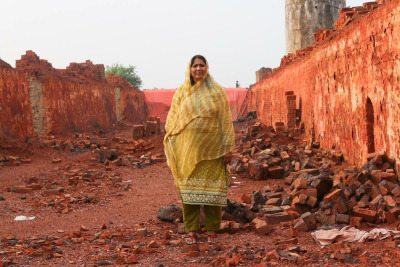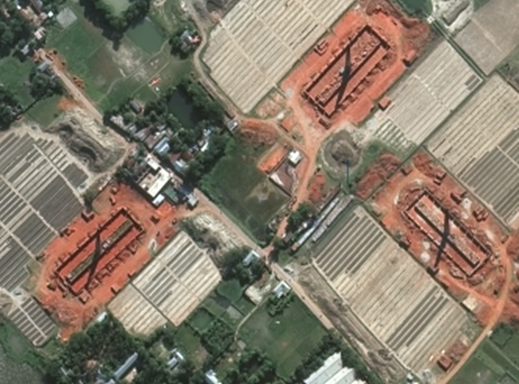 Over the past few days, Humans of New York photographer Brandon Stanton has raised over $2.2 million to support the work of an amazing humanitarian. Syeda Ghulam Fatima, widely known in her community as Pakistan’s Harriet Tubman, has made it her life’s work to end bonded labor – one of the last remaining forms of modern slavery.
[caption id="attachment_3917" align="alignright" width="400"]
Over the past few days, Humans of New York photographer Brandon Stanton has raised over $2.2 million to support the work of an amazing humanitarian. Syeda Ghulam Fatima, widely known in her community as Pakistan’s Harriet Tubman, has made it her life’s work to end bonded labor – one of the last remaining forms of modern slavery.
[caption id="attachment_3917" align="alignright" width="400"] Syeda Ghulam Fatima, described as a modern day Harriet Tubman in Pakistan, has devoted her life to ending bonded labor. She’s been electrocuted, shot and repeatedly beaten for her activism. Photo courtesy of Humans of New York.[/caption]
In Pakistan alone, there are an estimated 4.5 million people, including many children, working at 20,000 brick kilns across the country. Fatima’s organization, Bonded Labor Liberation Front, estimates that there are 40 families working at each kiln, each of whom are required to produce at least 1,000 bricks per day. They are forced to work long days in harsh, isolated conditions with one purpose, producing bricks.
Most of the workers trapped in bonded labor initially take loans from the kiln owners to pay family medical bills, funeral expenses, or school fees. However, these “loans” are almost impossible to repay, as kiln owners charge for food, housing, and days off, and debts quickly skyrocket. On top of that, the owners prevent workers from organizing for collective rights, and local authorities are often bribed to look the other way.
[caption id="attachment_3918" align="aligncenter" width="519"]
Syeda Ghulam Fatima, described as a modern day Harriet Tubman in Pakistan, has devoted her life to ending bonded labor. She’s been electrocuted, shot and repeatedly beaten for her activism. Photo courtesy of Humans of New York.[/caption]
In Pakistan alone, there are an estimated 4.5 million people, including many children, working at 20,000 brick kilns across the country. Fatima’s organization, Bonded Labor Liberation Front, estimates that there are 40 families working at each kiln, each of whom are required to produce at least 1,000 bricks per day. They are forced to work long days in harsh, isolated conditions with one purpose, producing bricks.
Most of the workers trapped in bonded labor initially take loans from the kiln owners to pay family medical bills, funeral expenses, or school fees. However, these “loans” are almost impossible to repay, as kiln owners charge for food, housing, and days off, and debts quickly skyrocket. On top of that, the owners prevent workers from organizing for collective rights, and local authorities are often bribed to look the other way.
[caption id="attachment_3918" align="aligncenter" width="519"] 30 cm photo from Madhabdi, Bangladesh exposes the kiln smokestacks, firing and drying facilities, excavated mud and stacks of finished bricks.[/caption]
While bringing more and more visibility to the issue of modern slavery will help free those already enslaved, broader institutional changes must also occur to ensure others cannot take advantage of the world’s most vulnerable. Change makers, like Fatima, cannot do this work alone. As an activist and humanitarian, Fatima continually puts herself in danger. She’s been electrocuted, shot, and repeatedly beaten for defending the rights of these kiln workers.
To truly free the 35.8 million enslaved people worldwide, coalitions of humanitarians, donors, information providers, governments and others must work together. Imagine if we were able to not only free those currently enslaved but also prevent slavery from happening in the future. Holding perpetrators accountable for these egregious violations is one step toward that goal.
To this end, DigitalGlobe has partnered with global development organizations and other stakeholders to catalyze change to dismantle slavery systems. Most recently, DigitalGlobe supported an investigation by the Associated Press to find a cargo ship loaded with slave-caught fish in the waters near Indonesia. This ship was operated by people from Myanmar, Cambodia and Laos who were sold, kidnapped and tricked into working the trawlers. In another effort, by monitoring India and Pakistan for illegally operated brick kilns, DigitalGlobe’s satellites became our watchful eyes in the sky, protecting human rights and holding those accountable with evidence.
[caption id="attachment_3923" align="aligncenter" width="450"]
30 cm photo from Madhabdi, Bangladesh exposes the kiln smokestacks, firing and drying facilities, excavated mud and stacks of finished bricks.[/caption]
While bringing more and more visibility to the issue of modern slavery will help free those already enslaved, broader institutional changes must also occur to ensure others cannot take advantage of the world’s most vulnerable. Change makers, like Fatima, cannot do this work alone. As an activist and humanitarian, Fatima continually puts herself in danger. She’s been electrocuted, shot, and repeatedly beaten for defending the rights of these kiln workers.
To truly free the 35.8 million enslaved people worldwide, coalitions of humanitarians, donors, information providers, governments and others must work together. Imagine if we were able to not only free those currently enslaved but also prevent slavery from happening in the future. Holding perpetrators accountable for these egregious violations is one step toward that goal.
To this end, DigitalGlobe has partnered with global development organizations and other stakeholders to catalyze change to dismantle slavery systems. Most recently, DigitalGlobe supported an investigation by the Associated Press to find a cargo ship loaded with slave-caught fish in the waters near Indonesia. This ship was operated by people from Myanmar, Cambodia and Laos who were sold, kidnapped and tricked into working the trawlers. In another effort, by monitoring India and Pakistan for illegally operated brick kilns, DigitalGlobe’s satellites became our watchful eyes in the sky, protecting human rights and holding those accountable with evidence.
[caption id="attachment_3923" align="aligncenter" width="450"] In this July 14, 2015 satellite image provided to the Associated Press, two fishing trawlers load slave-caught fish onto a refrigerated cargo ship off the coast of Papua New Guinea.[/caption]
Learn more about how DigitalGlobe supports humanitarians in the fight to end modern slavery.
Read more personal stories from the Humans of New York feature on Fatima and the brick kiln workers themselves.
I’ve signed the declaration to protect human dignity and end slavery. Will you?
In this July 14, 2015 satellite image provided to the Associated Press, two fishing trawlers load slave-caught fish onto a refrigerated cargo ship off the coast of Papua New Guinea.[/caption]
Learn more about how DigitalGlobe supports humanitarians in the fight to end modern slavery.
Read more personal stories from the Humans of New York feature on Fatima and the brick kiln workers themselves.
I’ve signed the declaration to protect human dignity and end slavery. Will you?